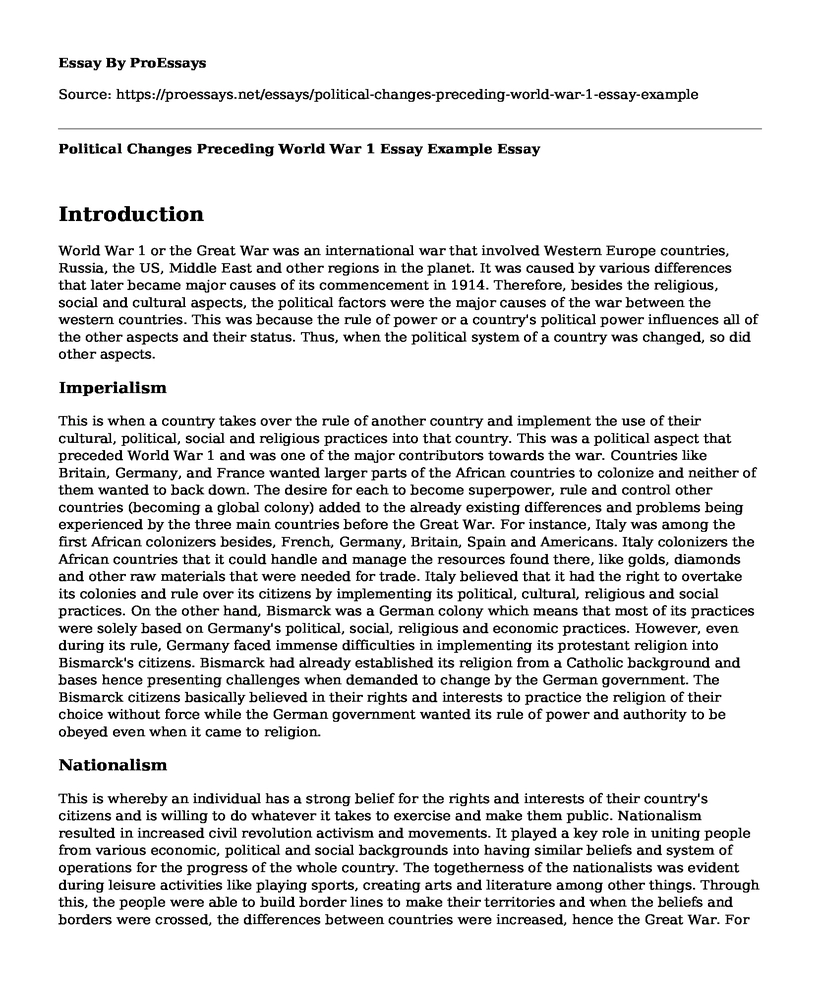Introduction
World War 1 or the Great War was an international war that involved Western Europe countries, Russia, the US, Middle East and other regions in the planet. It was caused by various differences that later became major causes of its commencement in 1914. Therefore, besides the religious, social and cultural aspects, the political factors were the major causes of the war between the western countries. This was because the rule of power or a country's political power influences all of the other aspects and their status. Thus, when the political system of a country was changed, so did other aspects.
Imperialism
This is when a country takes over the rule of another country and implement the use of their cultural, political, social and religious practices into that country. This was a political aspect that preceded World War 1 and was one of the major contributors towards the war. Countries like Britain, Germany, and France wanted larger parts of the African countries to colonize and neither of them wanted to back down. The desire for each to become superpower, rule and control other countries (becoming a global colony) added to the already existing differences and problems being experienced by the three main countries before the Great War. For instance, Italy was among the first African colonizers besides, French, Germany, Britain, Spain and Americans. Italy colonizers the African countries that it could handle and manage the resources found there, like golds, diamonds and other raw materials that were needed for trade. Italy believed that it had the right to overtake its colonies and rule over its citizens by implementing its political, cultural, religious and social practices. On the other hand, Bismarck was a German colony which means that most of its practices were solely based on Germany's political, social, religious and economic practices. However, even during its rule, Germany faced immense difficulties in implementing its protestant religion into Bismarck's citizens. Bismarck had already established its religion from a Catholic background and bases hence presenting challenges when demanded to change by the German government. The Bismarck citizens basically believed in their rights and interests to practice the religion of their choice without force while the German government wanted its rule of power and authority to be obeyed even when it came to religion.
Nationalism
This is whereby an individual has a strong belief for the rights and interests of their country's citizens and is willing to do whatever it takes to exercise and make them public. Nationalism resulted in increased civil revolution activism and movements. It played a key role in uniting people from various economic, political and social backgrounds into having similar beliefs and system of operations for the progress of the whole country. The togetherness of the nationalists was evident during leisure activities like playing sports, creating arts and literature among other things. Through this, the people were able to build border lines to make their territories and when the beliefs and borders were crossed, the differences between countries were increased, hence the Great War. For instance, Russia strived to realize benefits from its nationalism but failed immensely. Comparing its benefits to that of its rivals, Russia needed to implement more of its nationalism into every aspect of the country, i.e. economic, political and social.
Political Structures Modernization
The desire for a changed political structure was also a contributing factor to World War 1. Britain, Germany, France, Austria, Hungary, Russia and other countries involved in the war, wanted a change in their political structure. They all wanted a more functional and effective structure that included a national assembly, parliament, and government rather than the monarchs they had been using. Also, they needed a more reliable structure that would support the country's needs, economically, socially and politically, during and after the war. For instance, France's political structure was very unstable and ineffective even with the already established National Assembly. This was because of the corruption and favoritism that was being practiced by most of the political parties and leaders. These negative issues affected a large portion of France's population benefiting the small portion who were economically stable and had influence. The citizens, therefore, wanted a greater say when it came to choosing their leaders especially after choosing Louis Napoleon who ruled the country until his retirement due to old age. There was immense nationalism in Ireland after Britain failed to economically support Ireland by ending the starvation of its farmers. The Irish Republican Brotherhood supported the rise of a new political structure (a promising prime minister) and rule (home rule) which would ensure the independence of Ireland from Britain. This change in political rules became the main contributor to the division of Ireland particularly during the World War 1.
Cite this page
Political Changes Preceding World War 1 Essay Example. (2022, Nov 20). Retrieved from https://proessays.net/essays/political-changes-preceding-world-war-1-essay-example
If you are the original author of this essay and no longer wish to have it published on the ProEssays website, please click below to request its removal:
- Dear America: Letters Home From Vietnam
- Paper Example on Terrorism After Cold War
- Essay on Public Health: Challenges and Policy Issues
- Essay on the Limits of Political Blindness: Re-examining Democracy's Pillars
- Expanding First Amendment Reach in the Age of Social Media - Essay Sample
- Paper Example on Renaissance Art: From Rome to the Present Day
- African American and Native American History - Free Essay Sample







